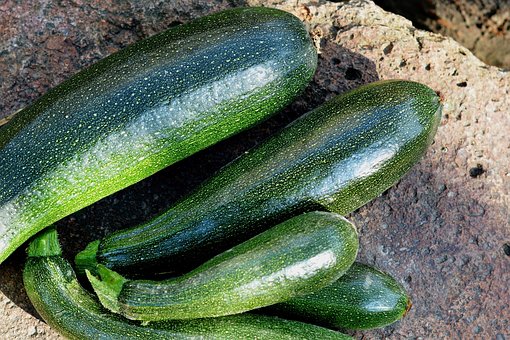Courgettes Are Low in Calories and High in Nutrients
© HealthyMuslim. See Terms and Conditions

Courgettes are a type of summer squash. The entire vegetable, including its flesh, seeds, skin and flowers, are edible. Commonly, the courgette resembles the cucumber in size and shape, although other shaped courgettes are also available. It has smooth, thin skin that is either green or yellow in color and can be striped or speckled. Its tender flesh is creamy white in color, and contains numerous seeds.
Courgettes are goods sources of the vitamins B1, B2, B6, K, beta carotene and folic acid. They also contain copper, magnesium, phosphorus, potassium and fiber. Courgettes are particularly rich in manganese, which helps to regulate blood sugar levels.
Promote Optimal Health
Although not as potent as root vegetables like garlic or onion, squashes have been found to have anti-cancer type effects. Studies have shown vegetable juices obtained from squash to be parallel to juices made from leeks, pumpkin, and radish in their ability to prevent cell mutations.
The nutrients found in summer squash, including the courgette, are useful for the prevention of many other conditions. High intakes of fiber-rich foods help to keep cancer-causing toxins away from cells in the colon, while the folate, Vitamin C, and Beta-carotene help to protect these cells from the chemicals that can lead to colon cancer. The antioxidants Vitamin C and Beta-carotene also have anti-inflammatory properties that make them helpful for conditions like asthma, osteoarthritis, and rheumatoid arthritis, where inflammation plays a big role.
Tips for Using Courgettes
- Courgettes can be cooked in numerous ways or eaten raw as a snack or in salads.
- Add raw, grated courgette to salads and sandwiches.
- If the courgette is organic or home-grown, for maximum health benefits, don't throw away the skin as many of the nutrients are contained in this layer.
- Courgettes are easy to grow yourself at home- they are fast-growing and just one plant provides a plentiful supply of delicious, fresh vegetables.
Link to this article: Show: HTML Link • Full Link • Short Link
Share or Bookmark this page: You will need to have an account with the selected service in order to post links or bookmark this page.





|
Related Articles:
Add a Comment
You must be registered and logged in to comment.
Most Popular
Latest Articles
Popular Subjects
Health, fitness and longevity
Based upon the principles of health
in the Qur'an and Prophetic Traditions.
HealthyMuslim.Com
There are two bounties in which
most people lose out: good health
and free time. Al-Bukhari.























